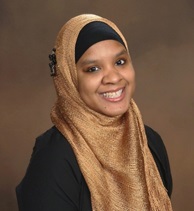NEW YORK – Popular African American Muslim novelist Umm Zakiyyah has adapted her best-selling book His Other Wife into a short film. The novel tells the story of recently-divorced Muslim convert Aliyyah and her adjustments to her new life as a single Muslim woman in American Muslim society.
Umm Zakiyyah is one of the best-known of an expanding group of African American Muslim authors whose work centers on the Islamic faith within an African American Muslim context.
Umm Zakiyyah’s first novel, If I Should Speak, reached a global Muslim audience and catapulted the author’s name into international popularity.
The Novel
His Other Wife began as an online short story in 2015. In 2016, Umm Zakiyyah released a full novel based on the popular short story. The Short film marks another level of the author’s work.

Photo Source: http://ummzakiyyah.com/
Umm Zakiyyah started writing in 2011, and her repertoire expanded over the years. The author told AboutIslam.net it is important to her that His Other Wife focuses on the African American Muslim experience.
“I wanted to have a book that presented the experience of Muslims and definitely have the African American Muslim experience. That’s my background; it’s what I am most familiar with,” she told AboutIslam.
Although Umm Zakiyyah focuses highly on African American Muslim experiences, His Other Wife, like many of her novels, shows the author’s ability to allow Muslims and non-Muslims outside those experiences to connect to the characters and content.
“A lot of my readership are non-Muslims. Some high schools have picked the book for students to read. It is mainly used for intercultural studies, but I find a lot of non-Muslims are fascinated with it for casual reading. They just want a good book.”
The Adaptation

Photo Source: http://ummzakiyyah.com/
Khalil Ismail directed His Other Wife film, who, according to his official bio, is a creative director and award-winning independent artist. He is a producer, the founder, and manager of KI Creative Studios as well as a musician and lyricist.
When asked why he chose to direct this particular project, Ismail explained his decision-making process.
“It might have chosen me more than I chose it. I am not a novel reader, but this was a one that I read to completion. Many of the lessons in the novel spoke to me, and Umm Zakiyyah’s writes in a way that makes it easy to visualize what is happening in her stories. So, it was natural that this book could be adapted into a movie,” he said.
Ismail told AboutIslam that the short film is a prequel to a possible full-length feature.
“Inshallah, we will take this around the world and raise funds. We will turn it into a full-length feature film.”
Khalil also anticipates that non-Muslim audiences connecting with the messaging in His Other Wife.
“At the end of the day, relationships are relationships. We all tend to feel the same things. It relates to non-Muslims because they will recognize what a toxic relationship looks like when someone is being arrogant or cares,” he said.
His Other Wife Short Film Trailer from ki creative studios on Vimeo.
Majority Muslim Cast
The film’s cast is comprised of mainly Muslims, with African American Muslim actors executing the major roles.
Asaati plays Aliyyah, a recently-divorced Muslim woman trying to get her life together with “help” from her best friend Deanna, played by Jamillah El-Amin. Both women face a series of challenges that test their friendship and faith.
Former NFL player Hamza Abdullah plays Jacob, who is struggling to decide just how happy he is with his life, and Nurideen Bashir plays Larry, Jacob’s cousin and Muslim convert looking for a new love to go with his new religion.
Both Umm Zakiyyah and Khalil Ismail told AboutIslam that it was crucial for them to find African American Muslims to play the roles of main characters Aliyah, Jacob, Deanna and Larry.
Umm Zakiyyah asserts the importance of having actors who can draw from spiritual literacy to produce credible Muslim characters.
“People have tried [to portray Muslims] on film, but they have not been convincing to me. Khalil and I did our research; we concluded a basic, profound truth that the trick to getting excellent acting is that none of the characters should be acting,” she said.
“When you are playing the part of a Muslim or someone that has to get in touch with that spiritual part if that isn’t part of your life and reality, where do you reach for that? It has to be a part of you.”
“We thought that there was no way people were going to get the nuances of living a Muslim life and be able to take the script and turn it into life like Muslims who have lived it,” Ismail told AboutIslam.
Umm Zakiyyah and Ismail expressed their satisfaction with all the actors’ final performances.
Playing the Part

Photo Source: http://khalilismail.com/
Actress Asaati told AboutIslam some of the reasons she chose to play Aliyyah in His Other Wife.
“I was born Muslim, and my family was pretty open to Islam. But I found that as I grew up, went to college, and entered the professional world that a lot of people did not have the same openness as my family. Many non-Muslims had this perception that we weren’t real people, and we didn’t have issues, troubles or drama but lived a cookie-cutter, scripted life,” she said.
“When I read Umm Zakiyyah’s script, I could identify with different aspects of many of the characters. I decided that we need to have this conversation, and that I want to be a part of it. I think this is very important not just for Muslims today but for future generations to look back and see Muslims telling our stories,” told AboutIslam.
Asaati also explained some of the advantages of working with a Muslim cast.
“In some aspects of working through the script, it was easier. We were able to get that vibe from each other. You didn’t need to have that conversation with a brother not to touch you in a scene. It’s already understood.”
Umm Zakiyyah, Khalil Ismail and members of the cast plan to tour the short film nationally and across the globe to share this powerful story about Muslim relationships.